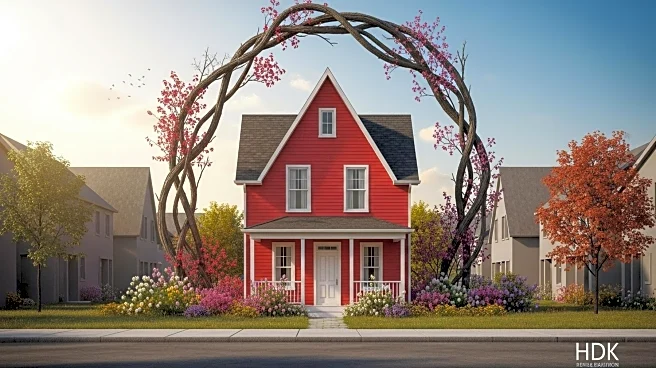What's Happening?
The Olney Theatre Center is hosting the U.S. premiere of 'Red Pitch,' a play originally from London's West End. Written by Tyrell Williams, the play uses soccer as a metaphor to explore themes of gentrification, deferred dreams, and the complexities of friendships among three Black English teenagers. The production is noted for its realistic portrayal of soccer, achieved through training sessions led by Maryland-based coach Malcolm Harris. The actors, Ty'Ree Hope Davis, Angelo Harrington II, and Terrence Griffin, deliver performances that capture the essence of youthful camaraderie and the challenges faced by their characters. The play is set in a South London neighborhood undergoing redevelopment, affecting local businesses and the community's fabric.
Why It's Important?
The premiere of 'Red Pitch' in the U.S. brings attention to the ongoing issues of gentrification and its impact on communities, particularly those of color. By showcasing the struggles and aspirations of its characters, the play offers a poignant reflection on how urban development can disrupt lives and alter the social landscape. The production's focus on soccer as a narrative device also highlights the universal appeal of sports as a means of connection and expression. This play could resonate with audiences across the U.S., sparking conversations about urban policy, community preservation, and the importance of maintaining cultural heritage amidst change.
What's Next?
Following its premiere, 'Red Pitch' may continue to attract attention from theatergoers and critics alike, potentially leading to further performances across the U.S. The themes of the play could inspire discussions among policymakers and community leaders about the effects of gentrification and the need for inclusive urban planning. Additionally, the success of the production might encourage other theaters to explore similar narratives that address social issues through the arts.
Beyond the Headlines
The play's exploration of friendship and dreams amidst societal change offers a deeper look at the personal impact of gentrification. It raises questions about identity, belonging, and the resilience of communities facing external pressures. The artistic choice to blend realism with fantastical elements allows audiences to engage with the characters' inner worlds, providing a nuanced understanding of their experiences and aspirations.









